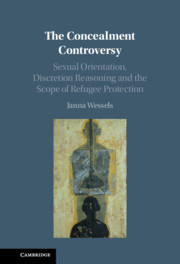 The Concealment Controversy
The Concealment Controversy Book contents
- The Concealment Controversy
- The Concealment Controversy
- Copyright page
- Contents
- Figures
- Tables
- Acknowledgements
- 1 The Concealment Controversy
- 2 Unpacking the Controversy
- Part I Tracing ‘Discretion’ Reasoning
- 3 Rejecting ‘Discretion’
- 4 Manifestly Asserted
- 5 Irreversibly Determined
- 6 Singled Out
- Part I Conclusions
- Part II Exploring the Limits of Protection
- Conclusion
- Annex
- Bibliography
- Index
6 - Singled Out
Spain
from Part I - Tracing ‘Discretion’ Reasoning
Published online by Cambridge University Press: 19 July 2021
- The Concealment Controversy
- The Concealment Controversy
- Copyright page
- Contents
- Figures
- Tables
- Acknowledgements
- 1 The Concealment Controversy
- 2 Unpacking the Controversy
- Part I Tracing ‘Discretion’ Reasoning
- 3 Rejecting ‘Discretion’
- 4 Manifestly Asserted
- 5 Irreversibly Determined
- 6 Singled Out
- Part I Conclusions
- Part II Exploring the Limits of Protection
- Conclusion
- Annex
- Bibliography
- Index
Summary
Chapter 6 is dedicated to decision-making practice regarding sexuality-based asylum claims in Spain. Here, the act/identity emerges from the holding that ‘mere membership’ is not sufficient for a claim to be accepted; claimants needed to have been ‘singled out’ for persecution. This involved the requirement that the claimant had already been ‘outed’ and identified by the persecutor. The focus is on the claimant’s past externalising act. If claimants had not been ‘outed’ to the persecutor and therefore suffered prosecution, they were not entitled to protection in Spain. Spanish jurisprudence developed largely independently from international developments and there was no notable impact of the UK Supreme Court or the CJEU judgments on this approach in Spain. The Qualification Directive, however, which stipulated that persecution can also emanate from non-state actors (which had previously been rejected in Spain), led to the invention of the doctrinal figure of ‘significant transcendence’ in Spanish jurisprudence: claimants who had suffered harm at the hands of non-state actors had to provide written proof that the harm was inflicted due to their sexual orientation (irrespective of their identity) – otherwise they would be returned to (re-)concealment.
Keywords
- Type
- Chapter
- Information
- The Concealment ControversySexual Orientation, Discretion Reasoning and the Scope of Refugee Protection, pp. 128 - 162Publisher: Cambridge University PressPrint publication year: 2021
